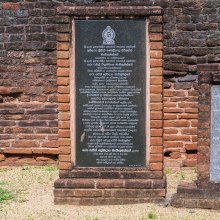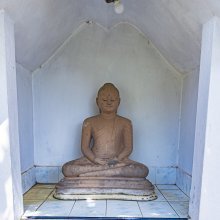Nivasa, Nivāsa, Nivasha: 18 definitions
Introduction:
Nivasa means something in Hinduism, Sanskrit, Buddhism, Pali, Marathi, Jainism, Prakrit, Hindi. If you want to know the exact meaning, history, etymology or English translation of this term then check out the descriptions on this page. Add your comment or reference to a book if you want to contribute to this summary article.
Nivasa has 17 English definitions available.
Images (photo gallery)
Languages of India and abroad
Sanskrit dictionary
[Deutsch Wörterbuch]
Source: Cologne Digital Sanskrit Dictionaries: Böhtlingk and Roth Grosses Petersburger WörterbuchNivāśa (निवाश):—
--- OR ---
Nivāsa (निवास):—1. (von vas, vasati mit ni) m. der Anlaut geht niemals in ṇa über nach gaṇa kṣubhnādi zu [Pāṇini’s acht Bücher 8, 4, 39.]
1) das Wohnen, Aufenthalt. das Uebernachten: idaṃ vṛtaṃ nivāsāya [Arjunasamāgama 9, 29.] tamasātīra [Rāmāyaṇa 2, 46] in der Unterschr. des Sarga. śivena vai yāhi samīpsitaṃ vanaṃ sukhaṃ nivāsāya [Rāmāyaṇa 3, 5, 22.] girīndrakandaradarīkuñje [Bhartṛhari 3, 79.] bhavaneṣu [Śākuntala 179.] nivāsahetorguptaṃ ca gacchāmo mathurāmitaḥ [Kathāsaritsāgara 10, 105.] [Spr. 460, v. l.] kumbhakārasya śālāyāṃ nivāsaṃ cakrire tadā [Mahābhārata 1, 6950.] viśrāntavāhanāḥ sarve nivāsāyopasaṃsthitāḥ [Harivaṃśa 9700.] nināyainaṃ nivāsāya vipramaṭhaṃ niśi [Kathāsaritsāgara 18, 105.] —
2) Wohnstätte, Aufenthaltsort [Pāṇini’s acht Bücher 6, 1, 201.] [Patañjali] zu [Pāṇini’s acht Bücher 4, 3, 89.] [Hemacandra’s Abhidhānacintāmaṇi 991.] [Bhagavadgītā 9, 18.] [Hiḍimbavadha 4, 29.] [Mahābhārata 4, 13.] [Rāmāyaṇa 3, 65, 19.] [Pāṇini’s acht Bücher 4, 2, 69.] [Scholiast] zu [Pāṇini’s acht Bücher 1, 2, 51.] vāstu [Suśruta 1, 16, 19.] [Bhāgavatapurāṇa 2, 1, 36. 4. 18. 30.] svargagrāmakuṭī [Bhartṛhari 3, 72.] ambhojinīvana [2, 15.] uṣṭrāṇām [Pāṇini’s acht Bücher 4. 2, 69,] [Scholiast] piṅgalāyāḥ [Varāhamihira’s Bṛhajjātaka S. 87, 40.] nāgasya [Śiśupālavadha 4, 63.] cintāyāḥ (dāridrya) [Mṛcchakaṭikā 8, 18.] śriyaḥ [Bhāgavatapurāṇa 1, 11, 27.] śrī (s. auch bes.) [16, 31. 3, 7, 28.] Nachtlager [Rāmāyaṇa 2, 55, 33.] rājan der König des Landes, in dem man wohnt, [Yājñavalkya’s Gesetzbuch 3, 25.] — Vgl. jagannivāsa (auch [Bhagavadgītā 11, 37.] [Bhāgavatapurāṇa 8, 3, 31.] von Śiva [Mahābhārata 13, 899]), yādo .
--- OR ---
Nivāsa (निवास):—2. (von vas, vaste mit ni) m. Kleidung: carma in Fell gekleidet [Harivaṃśa 10679.]
--- OR ---
Nivāsa (निवास):—1.
1) nivāsamupayāsyati wird bewohnt werden [Rāmāyaṇa 7, 111, 10.] tatra (nagare) caikasya viprasya nivāsāyāviśaṃ gṛham um zu übernachten [Kathāsaritsāgara 61, 98.] —
2) [Rāmāyaṇa 7, 3, 23.]
Source: Cologne Digital Sanskrit Dictionaries: Sanskrit-Wörterbuch in kürzerer FassungNivāśa (निवाश):—Adj. brüllend , dröhnend.
--- OR ---
Nivāsa (निवास):—1. m. Kleidung. Am Ende eines adj. Comp. gekleidet in.
--- OR ---
Nivāsa (निवास):—2. m. —
1) das Haltmachen , Uebernachten , Wohnen , Aufenthalt. —
2) Nachtlager , Aufenthaltsort , Wohnstätte. nivāsam upa-yā bewohnt werden.
Sanskrit, also spelled संस्कृतम् (saṃskṛtam), is an ancient language of India commonly seen as the grandmother of the Indo-European language family (even English!). Closely allied with Prakrit and Pali, Sanskrit is more exhaustive in both grammar and terms and has the most extensive collection of literature in the world, greatly surpassing its sister-languages Greek and Latin.
See also (Relevant definitions)
Partial matches: Vasa, Vaca, Ni.
Starts with (+4): Nivacam, Nivacati, Nivasa-m, Nivasabhavana, Nivasabhumi, Nivasabhuya, Nivasacarya, Nivasaka, Nivasana, Nivasani, Nivasanta, Nivasanti, Nivasanusmriti, Nivasaracana, Nivasarachana, Nivasarajan, Nivasasthana, Nivasat, Nivasata, Nivasatha.
Ends with (+31): Adhikritanivasa, Ahinivasa, Akutobhayanivasa, Anivasa, Aryanivasa, Badhula shrinivasa, Chidranivasa, Dharmanivasa, Dvitridivasanivasa, Dyunivasa, Garbhanivasa, Jaganivasa, Jagannivasa, Jannivasa, Jayashrinivasa, Kashmirikanivasa, Kelinivasa, Kshamadharanivasa, Kukshinivasa, Kvanivasa.
Full-text (+70): Shrinivasa, Dyunivasa, Nivasaka, Nivas, Vrikshanivasa, Yadonivasas, Nivasabhuya, Nivasabhavana, Nivasaracana, Jagannivasa, Nivasin, Kvanivasa, Naivasika, Nivasabhumi, Sannivasa, Nivasarajan, Nivasavriksha, Nivasata, Nivasasthana, Shrinivasadikshitiya.
Relevant text
Search found 27 books and stories containing Nivasa, Ni-vasa, Ni-vāsa, Ni-vāśa, Ni-vasha, Nivāsa, Nivāśa, Ṇivasa, Ṇivāsa, Nivasha; (plurals include: Nivasas, vasas, vāsas, vāśas, vashas, Nivāsas, Nivāśas, Ṇivasas, Ṇivāsas, Nivashas). You can also click to the full overview containing English textual excerpts. Below are direct links for the most relevant articles:
Garga Samhita (English) (by Danavir Goswami)
Verse 6.21.12 < [Chapter 21 - In the Description of the Third Fort, the Glories of Piṇḍāraka-tīrtha]
Verse 6.21.30 < [Chapter 21 - In the Description of the Third Fort, the Glories of Piṇḍāraka-tīrtha]
Verse 8.13.31 < [Chapter 13 - A Thousand Names of Lord Balarāma]
Hari-bhakti-kalpa-latikā (by Sarasvati Thkura)
Text 1 < [First Stabaka]
Brihad Bhagavatamrita (commentary) (by Śrī Śrīmad Bhaktivedānta Nārāyana Gosvāmī Mahārāja)
Verse 2.4.87 < [Chapter 4 - Vaikuṇṭha (the spiritual world)]
Verse 2.3.64 < [Chapter 3 - Bhajana (loving service)]
Verse 1.6.49 < [Chapter 6 - Priyatama (the most beloved devotees)]
Shrimad Bhagavad-gita (by Narayana Gosvami)
Verse 11.25 < [Chapter 11 - Viśvarūpa-darśana-yoga (beholding the Lord’s Universal Form)]
Verses 9.16-19 < [Chapter 9 - Rāja-guhya-yoga (Yoga through the most Confidential Knowledge)]
Verse 11.45 < [Chapter 11 - Viśvarūpa-darśana-yoga (beholding the Lord’s Universal Form)]
Tattvartha Sutra (with commentary) (by Vijay K. Jain)
Verse 3.19 - The nymphs (devī) living in lotuses < [Chapter 3 - The Lower World and the Middle World]
Verse 4.24 - Those who have the Brahmaloka as their abode < [Chapter 4 - The Celestial Beings]
Verse 7.6 - The observances for the vow of non-stealing (acaurya) < [Chapter 7 - The Five Vows]
Rig Veda (translation and commentary) (by H. H. Wilson)


